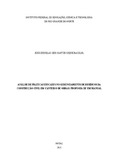Análise de práticas eficazes no gerenciamento de resíduos da construção civil em canteiro de obras: proposta de um manual

Visualizar/
Data
2021-07-01Autor
Silva, José Douglas dos Santos Siqueira
http://lattes.cnpq.br/9258555392862081
Metadado
Mostrar registro completoResumo
The construction industry is one of the most influential and important for the productive growth of Brazil, however, this sector has strong contribution to environmental degradation by the extraction of approximately 40% of non-renewable natural resources and the generation of large amounts of waste. Although there is all the legal framework for the management of waste on the construction site by means of Resolution No. 307 of the National Environment Council, there is still a lack of awareness and inadequate behavior of the agents involved, providing a systemic neglect in the management and management of this waste. This project aims to analyze the most effective practices of construction waste management (CWM) at a construction site in the city of Natal-RN. The research was divided into four Stages. In Stage 1, it was analyzed (based on literature, laws and norms) the content and design of the main bibliographies (manuals and primers) existing in Brazil about CWM. In step 2, the analysis of the most effective practices of CWM for the works in Natal/RN was carried out, through the Critical Success Factors - CSF method (with literature review, questionnaires and interviews). In Step 3, the content of the Construction Waste Management Plans (CWMP) of 4 construction sites in Natal/RN was evaluated to verify the current situation of these documents and to check if they are in accordance with the current laws. Finally, in Step 4, a manual (technical product) was produced for the elaboration and implementation of a PGRCC. The results of the analysis of the existing manuals showed that there is no manual or booklet available with theoretical/practical explanations about all the items required by the laws. From the analysis of the most effective practices and the questionnaires it was identified 13 CSF, 4 benefits generated with the deployment of the CWM and 5 reasons that make the city's construction companies not implement waste management. In relation to the evaluated CWMP it was also verified that they do not contemplate all the current legislations. From these results it was built an instrument directed to professionals and construction companies that will help in the development of the Plan and the management of more effective practices at the construction site. Therefore, this research directed its results towards the commitment to sustainability aiming at a cultural change for the agents involved, with a technical product capable of providing training and theoretical/practical framework to professionals and companies in the area in Natal/RN, encouraging the minimization, the reuse, the recycling, and the environmentally adequate disposal of construction waste (CW).



